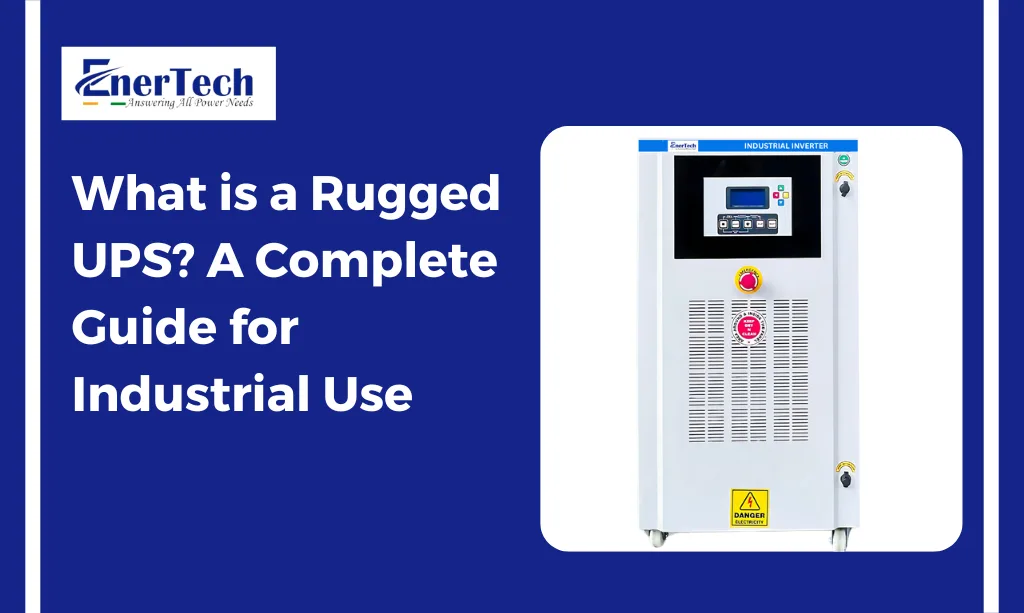While operating in harsh and demanding environments, industries often need supporting systems that endure the working conditions. UPS is one of those support elements.
However, conventional UPS systems often fail while coping with extreme circumstances. Hence, such applications often need a UPS that goes beyond the capabilities of its traditional counterparts and ensures a continuous power supply even in tough conditions.
The answer is a rugged UPS. But what is it, how does it work, what are its features and what are its benefits industries can bank on? Let’s address these questions in this blog.
Key Takeaways
- Rugged UPS systems endure harsh and demanding environments
- Uninterrupted power supply in extreme conditions
- Remote monitoring, robust casing, and shock resistance for reliability
- Trusted system for equipment protection and operational continuity
Rugged UPS – What is it?
A rugged UPS provides immediate backup power during a power interruption. But it is more resilient. Some factors that make it suitable for rugged, harsh, and demanding environments, include the following.
- Industrial-grade batteries with higher temperature tolerances
- Shock and vibration-proof housing
- Advanced thermal design for better heat dissipation
- Remote monitoring and diagnostics via Modbus or SNMP
- Filtered power outputs that protect sensitive industrial equipment
- Reinforced casings for added strength and durability
Features of a Rugged UPS
A rugged UPS system has some distinct features, making it a prudent choice for demanding industrial applications operating in harsh environments. Some of them include;
-
Extensive Operating Temperatures
Rugged UPS systems have wide operating temperatures. Hence, they operate seamlessly in extreme heat or cold. Thus, whether it is 20 degrees Celsius or 60 degrees and beyond, rugged UPSs work efficiently across outdoor or remote deployments.
-
Ingress Protection (IP) Ratings
These UPS systems keep out dust, dirt, and water, making them suitable for military or industrial use. In India, rugged UPSs typically have an IP rating of IP54 or IP65.
-
Shock and Vibration Resistance
They also have ruggedized housing and shock-mounting technology that endures transit or deployment in rough and tough terrains. Besides, MIL-STD-tested designs ensure operational stability across impact-prone and high-motion scenarios.
-
Remote Monitoring
Advanced UPS systems enable you to check monitor status, battery health checks, and alerts via secure interfaces. They have built-in diagnostics and communication ports that help with real-time alerts and performance tracking.
- High Power Density
Rugged UPS systems are compact, yet robust to support high-load equipment without occupying a lot of your productive space. Hence, industries also choose to tackle space constraints effectively and easily.
-
Long Runtime Support
These UPS systems also have alternatives for external battery packs or scalable energy modules for extended backup durations.
How Does a Rugged UPS Work?
The basic functioning is similar to a regular UPS. It provides temporary power during outages just like a traditional one. However, the only difference here is that of the conditions in which the rugged counterpart operates. The system usually employs an online double-conversion that provides the highest level of power protection. Here’s how it works.
- The incoming alternating current (AC) is converted to direct current (DC) and then to clean, pure sine wave AC power.
- High-capacity batteries receive continuous charging.
- During power interruptions, the system transitions to battery power with zero transfer time, ensuring continuous electricity flow to critical loads.
- The internal components have corrosion-resistant, heavy-gauge enclosures, usually with specialized coatings and fanless designs or redundant cooling systems that dissipate heat while preventing contaminants from entering the system.
Benefits of a Rugged UPS System
Now that we’ve seen what a rugged UPS is, its features, and how it functions, let’s overview some of its benefits.
- Rugged UPS systems ensure business continuity even during power outages, instabilities, or surges.
- They prevent damage to electronics and sensitive industrial equipment.
- The components are ruggedized to minimize failures and cause fewer service interventions.
- The system’s operational agility helps enable power resilience in unmanned, remote, or mobile installations.
These benefits make rugged UPS systems an integral part of various industrial applications. Let’s look at some of them next.
Applications of Rugged UPS
Here are some industries that use rugged UPS systems regularly.
- Oil and Gas: Offshore platforms and remote drilling systems
- Manufacturing and Automation: To shield sensors, robotics, PLCs, etc.
- Defense: To support communication, surveillance, and on-field tactical systems
- Logistics: For seamless operations of critical infrastructure like ticketing systems
Final Words!
In today’s competitive and fast-paced industrial world, where uninterrupted power supply can make or break your operational continuity, rugged UPS plays a crucial role. It is engineered to endure harsh environments and operate seamlessly while protecting critical industrial equipment from voltage fluctuations.
We hope the above helped you enhance your understanding of rugged UPS systems.
As for top-class industrial UPS and other UPS systems, you have EnerTech. Email us at sales@enertechups.com to connect with our experts and explore more about our products.




